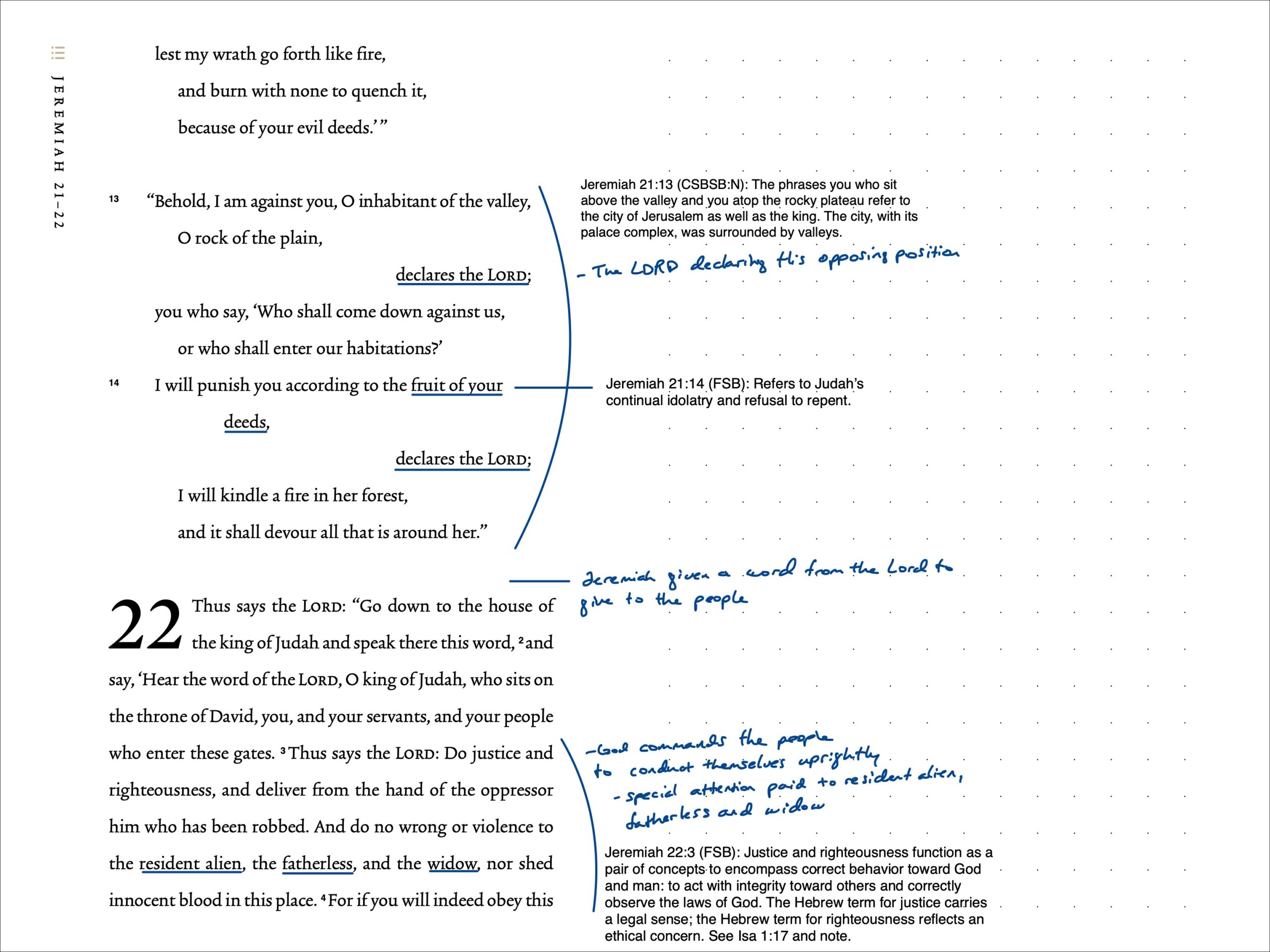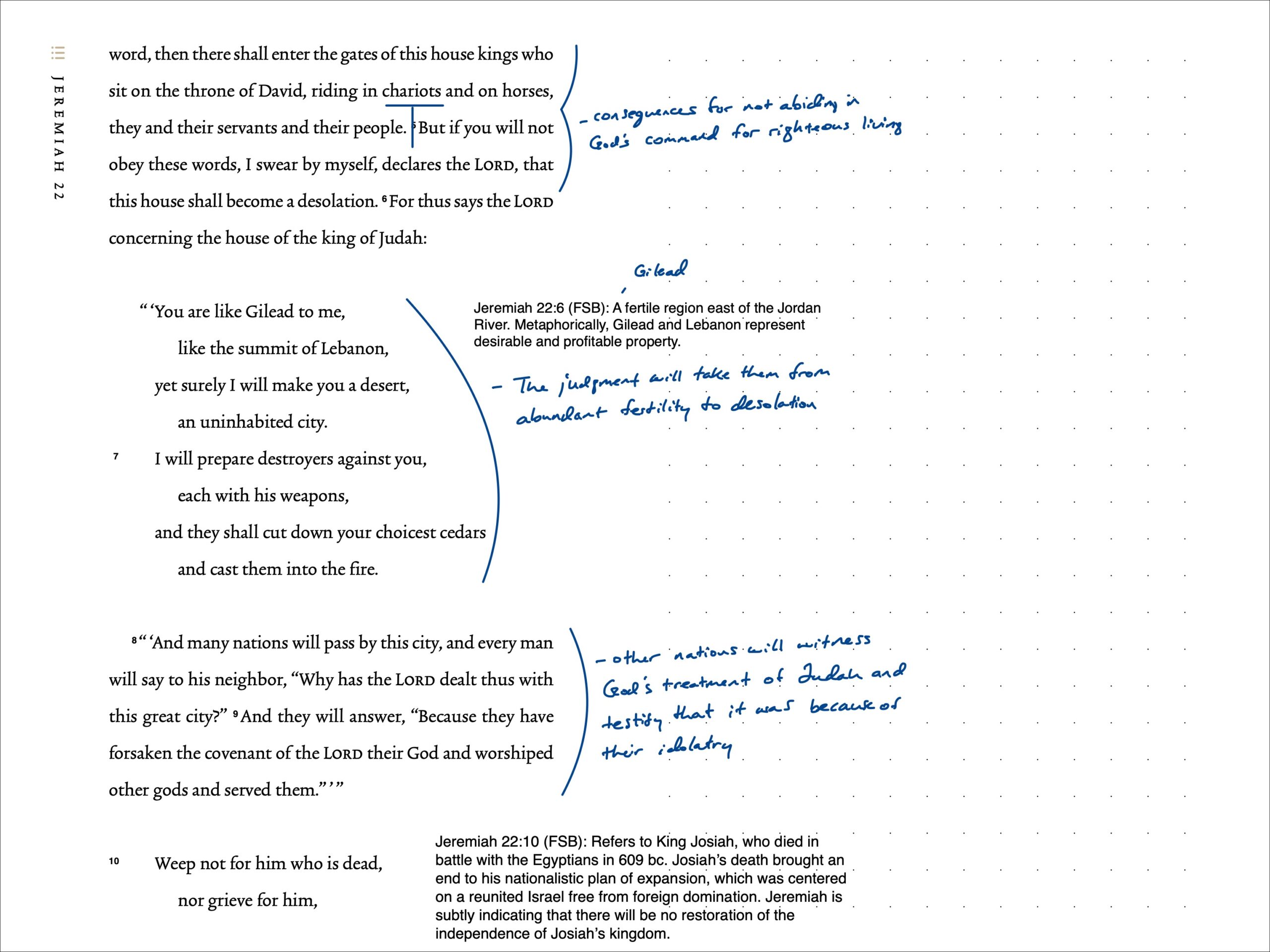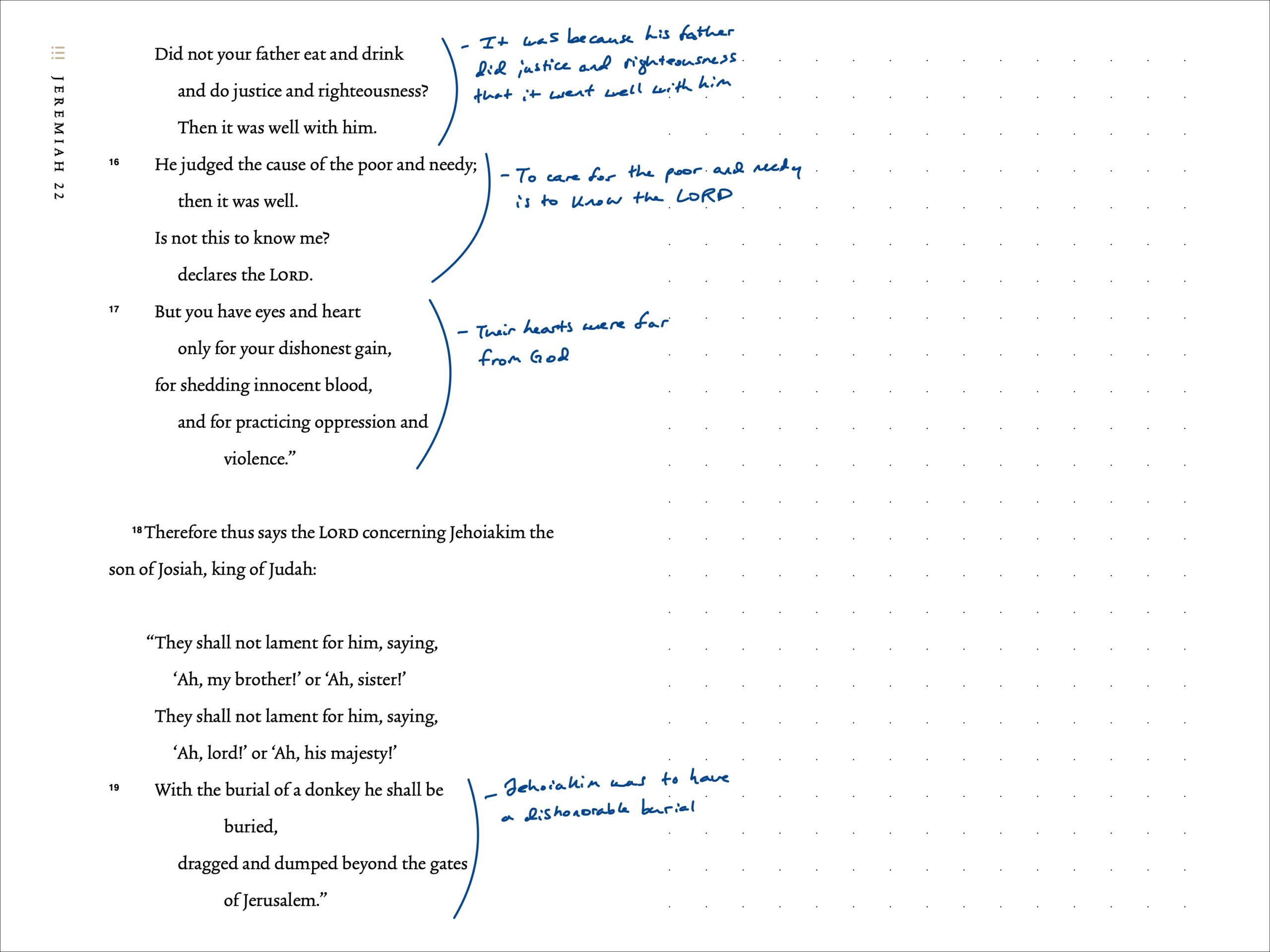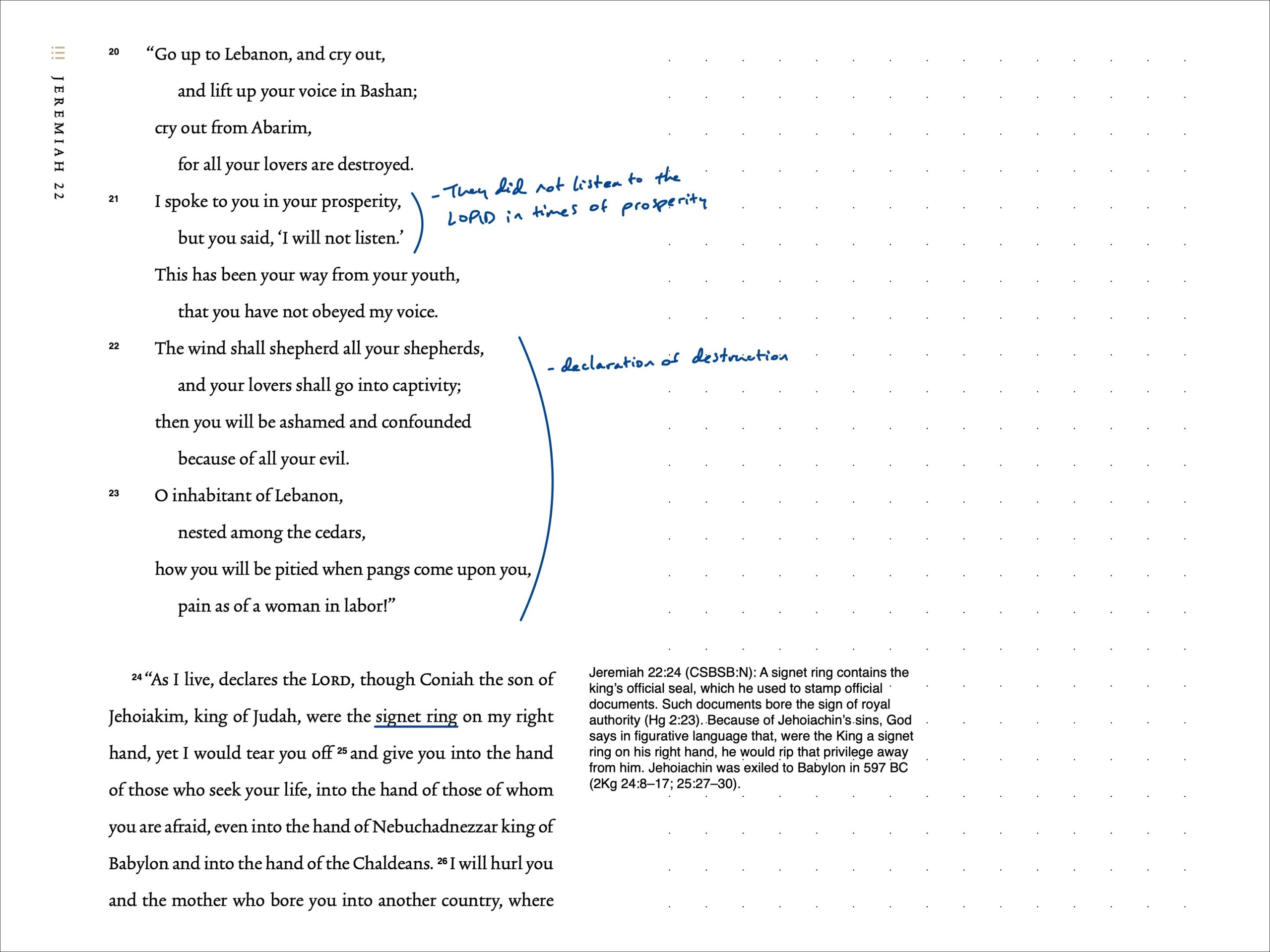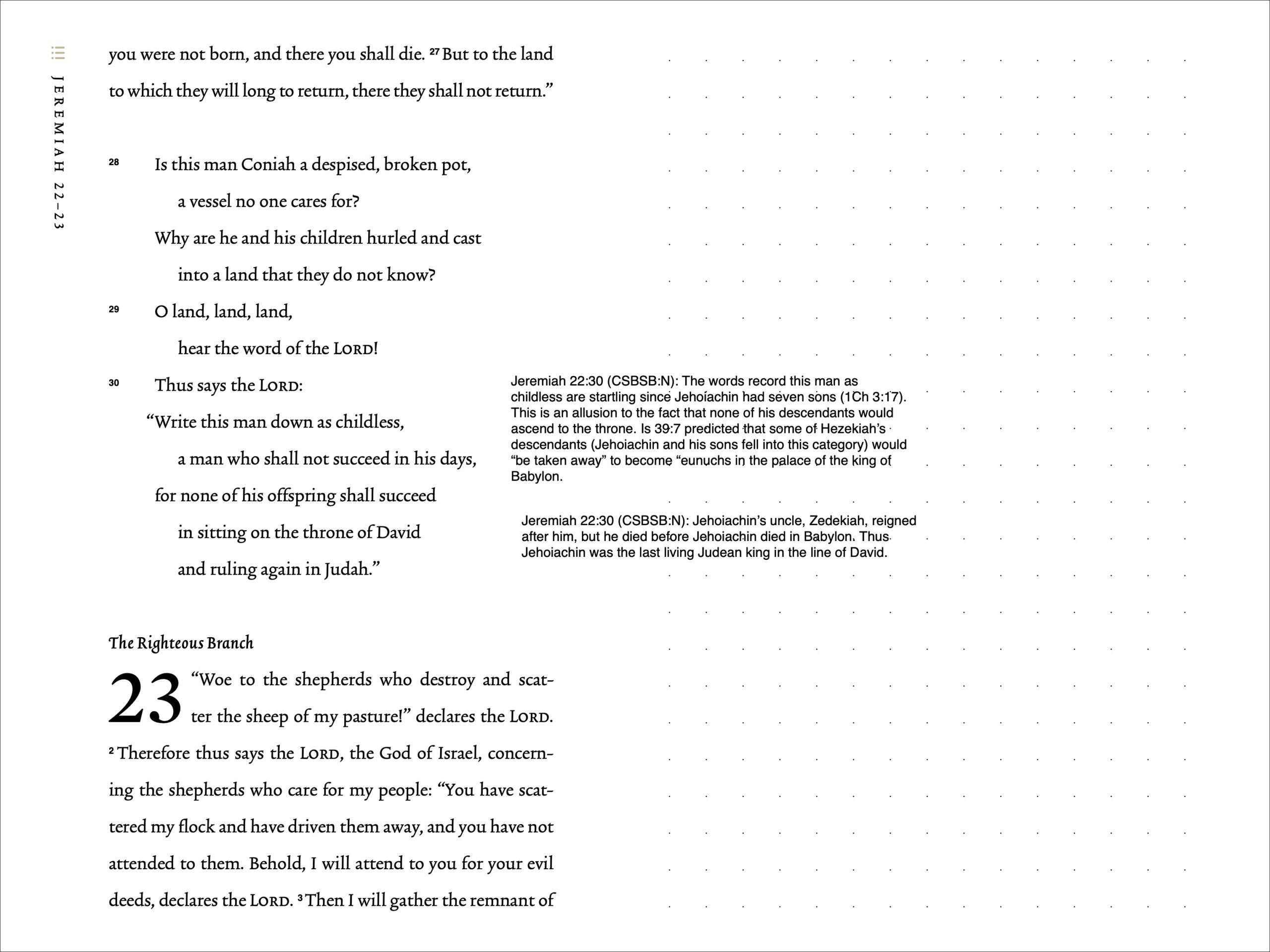| Date | Version | Reading Plan |
|---|---|---|
| @July 14, 2023 | ESV (2016) | ESV Prophets Plan 2023 |
Pericopes
- Message to the house of David
- Message to the sons of Josiah
Notes
The chapter opens with a word given to Jeremiah by the LORD that the people were to conduct themselves with “justice and righteousness” (Jer. 22:3). Three subgroups are specifically mentioned for equitable treatment: 1) resident alien, 2) fatherless and 3) widow. Justice and righteousness function as a pair of concepts to encompass correct behavior toward God and man: to act with integrity toward others and correctly observe the laws of God.
The consequences of not abiding in these commands comes in Jer. 22:5, that “this house will become a desolation”. God swears by Himself that this will come to pass because there is no one higher on whom to swear.
Jer. 22:6-7 show how the judgment will take them from abundant prosperity to desolation. Their prior state of fertility is likened to the choice cedars of Gilead and Lebanon which will be cut down and cast into the fire.
In Jer. 22:10, God tells them to “Weep not for him who is dead”, which refers to King Josiah, who died in battle with the Egyptians in 609 B.C. Josiah’s death ended the expansion and reunification campaign centered on freeing them from foreign domination. Jeremiah is subtly indicating that there will be no restoration of the independence of Josiah’s kingdom.
In Jer. 22:13-17, woe is declared to those who build by unrighteous means. Jehoiakim thought that luxurious buildings made a man a king (Jer. 22:15) but in actuality it was justice and righteousness. These characteristics were displayed by his father, leading to things going well with him (Jer. 22:15).
In Jer. 22:19, we see that Jehoiakim was to have a dishonorable burial, one unfit for a king. The details of his burial are unknown, but if he did receive a proper burial, it could have later been desecrated by the Babylonian invasion, thus fulfilling this prophecy.
In Jer. 22:24, the LORD declares that “though Coniah the son of Jehoiakim, king of Judah, were the signet ring on my right hand, yet I would tear you off”. A signet ring contains the king’s official seal, which he used to stamp official documents. Such documents bore the sign of royal authority (Hag. 2:23). Because of Jehoiachin’s sins, God says in figurative language that, were the King a signet ring on his right hand, he would rip that privilege away from him. Jehoiachin was exiled to Babylon in 597 BC (2 Kings 24:8–17; 2 Kings 25:27–30).
The final verse of the chapter (Jer. 22:30) is a command from the LORD to “Write this man down as childless”. The “man” referenced is Jehoiachin, which makes this statement seem startling since he had seven sons. However, none of them would ascend to the throne. It was Jehoiachin’s uncle that reigned after him, making Jehoichin the last living Judean king in the line of David.
Application
A couple of things stand out in this chapter. First, in Jer. 22:15 and the acquisition of possessions and personal luxury in the pursuit of kingly status. Scripture is saturated in its chiding our selfish initiatives and motivations. Paul David Tripp described this well when he said, “This side of heaven, there is a constant war being fought in all our hearts between the kingdom of self and the kingdom of God.” (What Did You Expect, p. 48).
The second was Jer. 22:21 when God spoke to His people in their prosperity and they responded by saying, “I will not listen”. To live in plenty is a tricky thing. We desire it and God earnestly desires to give it, but He also knows of our sinful inclinations to seek His gifts above Himself. As a wise Father, He is fully aware of the disaster that awaits in giving His children everything they want. Motivated by perfect love, he understands when to give and when to withhold, thereby leading us to view Him as our greatest treasure.
Scripture Journal Notes
Commentaries & Resources
- ESV Study Bible. (Wheaton, IL: Crossway, 2008)
- Faithlife Study Bible (Lexham Press, 2016)
- Believer’s Bible Commentary (Thomas Nelson, 2016)
- CSB Study Bible Notes (Holman Bible Publishers, 2017)
- Matthew Henry’s Commentary on the Whole Bible (Guardian Press, 1976)
- The Bible: A Reader’s Guide (Sterling Publishing, 2011)
- The Infographic Bible (Zondervan, 2018)
- ESV Digital Scripture Journal (Crossway, 2019)
